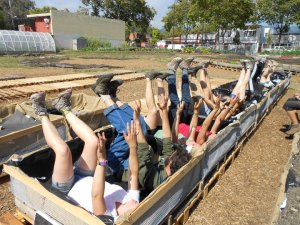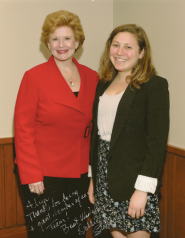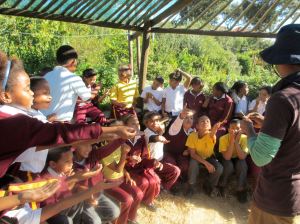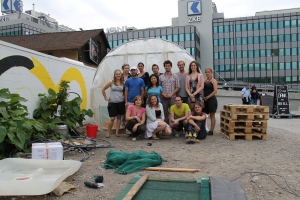I recently saw this article about an ad aired during the Super Bowl which failed to acknowledge the immigrant makeup of the workforce in today’s American farms. This spoke to me because of the strong images I hold from childhood of seeing migrant farmworkers bent over vast fields throughout Watsonville and Salinas. While my mom insisted that our family stay with friends when the heather fields neighboring our house were sprayed with toxic pesticides she didn’t want us exposed to, these farmworkers made their living fumigating these very fields.
Growing up, I also noticed that much of the food I saw people eating in the predominantly low-income communities where farmworkers lived was low-cost, processed, and packaged. Yet in Santa Cruz, where I went to school, mostly caucasian, middle-class residents touted “Buy Fresh, Buy Local” bumper stickers and shopped for organic produce at farmers’ markets. When I learned about the Farm Bill, a piece of legislation that plays a big part in impacting how America eats, I began to understand some of why the cheapest foods were also the least healthy, given agricultural subsidies.
Overall, these disparities drove me to advocate for social justice around food systems. I was compelled by environmental concerns and human health components, and I wanted to act on the inequalities I witnessed by increasing access to healthy, affordable food. I felt blessed by the positive role food played in my life as a force for community and joy, especially through Jewish cultural traditions, and I wanted to make this a more widespread reality.
I’ve pursued this interest at Stanford through my academic focus in Human Biology and through various experiences (there are lots of links embedded below!)

Growing people in the portable planter beds we constructed from shipping containers, hardwire cloth, burlap sacs, and food-grade plastic.
Urban Adamah: I was one of 12 fellows building a portable urban farm in West Berkeley on a one-acre plot of land. We donated the produce we grew to a neighboring church and nearby health clinic, both of which served low-income community members.
City Slicker Farms operates urban gardens in West Oakland and helps community members build and maintain their own backyard gardens. I helped them tend their gardens by practicing IPM (integrated pest management, AKA washing slugs off veggies) and helped out with a backyard garden build!

Senator Debbie Stabenow, Committee Chairwoman
U.S. Senate Agriculture Committee: After learning about the Farm Bill through the news, I actually got to work on it through my internship with Stanford in Washington! I attended senate hearings and briefings, wrote memos and reports, researched everything from Michigan beans to biofuels, and learned about food hubs on a trip to Virginia. I was constantly challenged to question my views as I heard from so many diverse stakeholders.
SEED: I worked with this environmental education organization in Cape Town, which operated school gardens across South Africa. My friend Hannah and I taught garden-based lessons.
ETH Zurich: I was one of 35 interdisciplinary, international students at a Swiss program on the world food system. We learned about everything from plant science to water footprints and visited a slaughterhouse and a Swiss chocolate factory. Then, my team of 13 worked with the head of a Jordanian NGO to design and build a rooftop aquaponics system that would mitigate food insecurity and water scarcity in Amman. Check out a video of the construction here.
Now, I’m taking a great class in the D. School focused on designing solutions to needs around healthy food access in East Palo Alto. AND I’m very excited to be sharing my passion with the class, exploring about the intersections between farms and oceans, and learning from the interests, experiences, and questions of our diverse students! After traveling the world to learn about these issues, it’s wonderful to return to my home community, where my interest in them was first sparked.



Having worked on the Farm Bill, what is your opinion on the amount of international food aid the United States currently provides? Is this number large compared to the magnitude of food produced? Is it projected to decrease and why? What countries does it go to? And how are we working on creating sustainable food solutions in areas afflicted by chronic hunger? What do you is our responsibility on the international “food front?”
When I saw the Super Bowl ad for the first time, I didn’t really get what the problem was. I then read the Huffington Post article, and figured out what the controversy was about. I’ve never really thought of the races of farmers. Coming from Japan where everyone is Japanese, race is a somewhat unfamiliar category to me. I was talking to my farmer friend form Minnesota, and he said that all farmers around there are white. I guess the farming population looks very different depending on the region.